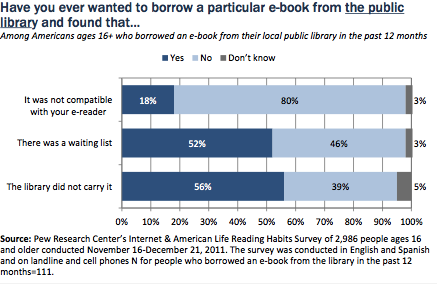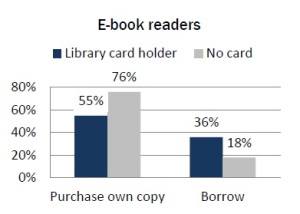Pew: Patrons Still Don’t Know Libraries Have Ebooks | ALA Annual 2012
Of Americans aged 16 and over, only 2 percent have borrowed an ebook from a library in the past year, The Pew Internet Project announced today at the American Library Association conference in Anaheim, CA. Although the numbers are higher for ebook readers, they’re still small: only 12 percent have borrowed an ebook from the library.
Though given the attention paid to the lack of availability of ebooks for libraries it would be natural to assume that was a major reason more patrons don’t borrow ebooks, it doesn’t appear to be the case. The biggest challenge to library ebook lending may be simply letting patrons know they have any at all. Of the general population, the Pew study found 62 percent don’t even know whether they’re local library loans ebooks (75 percent of them do), and the picture doesn’t get much better for library card holders: 58 percent still don’t know whether their library lends ebooks or not. Device ownership improves the picture but only slightly: 53 percent of tablet owners don’t know, and 48 percent of dedicated ereader owners (such as Nook or Kindle.) Some 47 percent of those who have read an ebook in the last year have no idea if they can do so from the library.
“It was a genuine surprise to see these data,” Lee Rainie, director of the Pew Internet Project, said.
Of those who do know whether their library lends ebooks, 22 percent knew that it did, and 14 percent, that it didn’t. Those who do know found out primarily either at the local branch or via direct online communication with the library, on the library website, catalog, or social media presence. As a result, libraries are much more effectively communicating their ebook offerings to those who already use the library regularly than they are to the larger population of ebook readers in the areas they serve.
Selection satisfactory?
 Patrons are more forgiving of libraries’ selection difficulties than some may have thought: Among those who do borrow ebooks, about one third, or 32 percent, say the selection is good; 18 percent said it is very good, and 16 percent, excellent. Only 23 percent say it is fair, 4 percent poor, and 8 percent don’t know. This is in spite of the fact that more than half, or 56 percent, have tried to borrow an ebook and found the library doesn’t have it. (52 percent have been put on a waiting list and 18 percent tried to borrow an ebook only to find it was not compatible with their device.)
Patrons are more forgiving of libraries’ selection difficulties than some may have thought: Among those who do borrow ebooks, about one third, or 32 percent, say the selection is good; 18 percent said it is very good, and 16 percent, excellent. Only 23 percent say it is fair, 4 percent poor, and 8 percent don’t know. This is in spite of the fact that more than half, or 56 percent, have tried to borrow an ebook and found the library doesn’t have it. (52 percent have been put on a waiting list and 18 percent tried to borrow an ebook only to find it was not compatible with their device.)
Of those who don’t already borrow ebooks, nearly half, or 46 percent, would be interested in borrowing devices with preloaded content, and about a third said they would be interested in library-led classes on device use or specifically how to download content.
book borrowers are ebook buyers
 The Pew survey also confirmed what LJ’s Patron Profiles found – ebook borrowers are ebook buyers, too. Some 41 percent of those who borrow ebooks from libraries had purchased the most recent ebook they’d read. In fact, 55 percent of ebook readers with library cards preferred to buy their ebooks, compared to 36 percent who preferred to borrow them, whether from the library or from friends. (Those proportions are roughly reversed for library ebook borrowers: 33 percent still prefer to buy, and 57 percent, to borrow.) When looking for a new ebook, only 12 percent look at the library first.
The Pew survey also confirmed what LJ’s Patron Profiles found – ebook borrowers are ebook buyers, too. Some 41 percent of those who borrow ebooks from libraries had purchased the most recent ebook they’d read. In fact, 55 percent of ebook readers with library cards preferred to buy their ebooks, compared to 36 percent who preferred to borrow them, whether from the library or from friends. (Those proportions are roughly reversed for library ebook borrowers: 33 percent still prefer to buy, and 57 percent, to borrow.) When looking for a new ebook, only 12 percent look at the library first.
The Pew study also confirmed that libraries act as discovery zones, not only for authors whose subsequent books the patron will buy, but sometimes even for particular books, especially ones the patron wants to reread or share with others. One respondent said of the Hunger Games books, “We got the books from the library after waiting a long time for reserved copies. We loved them so much that we are going to purchase the whole series tomorrow from the school Scholastic book order form. Also I have them all on my new iPad Kindle app, and my son is now able to start reading them.” As the quote demonstrates, library ebook readers not only buy books, they buy and read across multiple platforms.
Not surprisingly, readers of ebooks in households making at least $50,000 are more likely to want to purchase ebooks than those who make less. Device owners are also more likely to want to buy their books.
book readers at the library
Patrons who borrow ebooks often reported more checkouts but fewer physical library visits. This was particularly helpful to those with disabilities or in rural locations where getting to the branch could pose a challenge. However others responded that their e-borrowing supplemented rather than replaced their print borrowing, and one patrons even said it had increased print borrowing, because books found during e-browsing turned out to be available only in print.
Things ebook borrowers liked about the experience included instant access, lack of fines and eliminating the hassle of physically returning books. They were generally satisfied with the length of checkout periods (usually 203 weeks), but said they would like the ability to renew, as well as to return books early if finished. What they didn’t like included the difficulty of search and browsing, especially compared to the commercial experience at sites like Amazon.com, and the hassle of the checkout process, especially if it involves third parties.
How libraries handle ebooks
About half of the libraries surveyed pay for ebook acquisitions out of their collection budgets; the next more common response is participation in a consortium that provides access to ebooks.
Since library staff are educating patrons on how to download ebooks and sometimes how to use their own devices, staff training is crucial. Those who reported positive training experiences were primarily librarians who had extensive hands-on training with the devices, including being able to take them home and practice on their own. Theoretical training received bad marks, as did out of date training. (Keeping up with the pace of technological change was a commonly reported challenge.
RELATED
ALREADY A SUBSCRIBER? LOG IN
We are currently offering this content for free. Sign up now to activate your personal profile, where you can save articles for future viewing









Add Comment :-
Comment Policy:
Comment should not be empty !!!